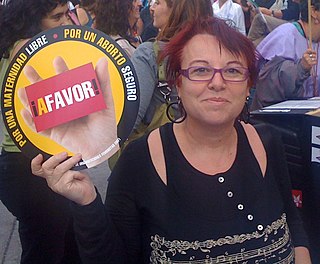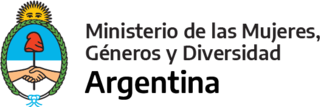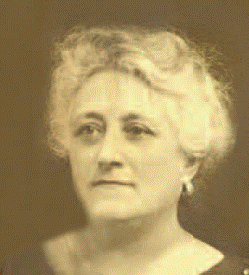Related Research Articles

The term travesti is used in Latin America to designate people who were assigned male at birth and develop a feminine gender identity. Other terms have been invented and are used in South America in an attempt to further distinguish it from cross-dressing, drag, and pathologizing connotations. In Spain, the term was used in a similar way during the Franco era, but it was replaced with the advent of the medical model of transsexuality in the late 1980s and early 1990s, in order to rule out negative stereotypes. The arrival of these concepts occurred later in Latin America than in Europe, so the concept of travesti lasted, with various connotations.
Feminism in Argentina is a set of movements aimed at defining, establishing, and defending equal political, economic, and social rights and equal opportunities for women in Argentina. Although some women have been considered precursors—among them Juana Manso and Juana Manuela Gorriti—feminism was introduced to the country as a result of the great European immigration wave that took place in the late 19th and early 20th century. The first feminists did not form a unified movement, but included anarchist and socialist activists, who incorporated women's issues into their revolutionary program, and prestigious freethinker women, who initially fought for access to higher education and, later, legal equality with men. The early 20th century was also full of women fighting for their freedom and rights in the workplace. Despite the efforts of the first-wave feminists, Argentine women did not acquire the right to vote until 1947, during Juan Perón's first government. His highly popular wife, Eva, championed women's suffrage and founded and ran the nation's first large-scale female political party, the Female Peronist Party. Although she refused to identify herself as a feminist, Eva Perón is valued for having redefined the role of women in politics.
Silvia Berger works at the Ministry of Economics and Production in Argentina, Latin American Council of Social Sciences (CLACSO), and is a post-graduate university teacher at the Latin American Social Sciences Institute. and past president of the International Association for Feminist Economics (IAFFE), her tenure was from 2017 to 2018. 7 Berger is a member of the editorial committee for the Mexican journal Ola Financiera.

LGBT in Argentina refers to the diversity of practices, militancies and cultural assessments on sexual diversity that were historically deployed in the territory that is currently the Argentine Republic. It is particularly difficult to find information on the incidence of homosexuality in societies from Hispanic America as a result of the anti-homosexual taboo derived from Christian morality, so most of the historical sources of its existence are found in acts of repression and punishment. One of the main conflicts encountered by LGBT history researchers is the use of modern concepts that were non-existent to people from the past, such as "homosexual", "transgender" and "travesti", falling into an anachronism. Non-heterosexuality was historically characterized as a public enemy: when power was exercised by the Catholic Church, it was regarded as a sin; during the late 19th and early 20th centuries, when it was in the hands of positivist thought, it was viewed as a disease; and later, with the advent of civil society, it became a crime.

Paulina Vinderman is an Argentine poet and translator.

Rita Laura Segato is an Argentine-Brazilian academic, who has been called "one of Latin America's most celebrated feminist anthropologists" and "one of the most lucid feminist thinkers of this era". She is specially known for her research oriented towards gender in indigenous villages and Latin American communities, violence against women and the relationships between gender, racism and colonialism. One of her specialist areas is the study of gender violence.

Montserrat Boix Piqué is a Spanish journalist, considered among the most influential women in her country. In early 2000, she created and developed the concepts of social cyberfeminism, and a year later those of feminist hacktivism. Another of her main areas of work is gender violence and communication. She has also stood out as a defender of the right to communication and citizenship rights for women. Since 1986, she has been a journalist for the Information Services of Televisión Española (TVE), in the international section.

Lohana Berkins was an Argentine travesti activist.

Rosa Cobo Bedía is a Spanish feminist, writer, and professor of sociology of gender at the University of A Coruña. She is also the director of the Center for Gender Studies and Feminists at the same university. Her main line of research is feminist theory and the sociology of gender.

Fourth-wave feminism in Spain is about digital participation in virtual spaces, encouraging debates and using collective force to enact change. It is about fighting patriarchal systems, denouncing violence against women, and discrimination and inequality faced by women. It is also about creating real and effective equality between women and men. It has several major themes, with the first and most important in a Spanish context being violence against women. Other themes include the abolition of prostitution, the condemnation of pornography, the support of legal abortion, the amplifying of women's voices, ensuring mothers and fathers both have access to parental leave, opposition to surrogacy, and wage and economic parity.

Diana Helena Maffía is an Argentine academic and politician.

The Ministry of Women, Genders and Diversity was a ministry of the Argentine Government tasked with overseeing the country's public policies on issues affecting women and gender and sexual minorities. The ministry was created in 2019, as one of the initial measures of President Alberto Fernández; the first minister was Elizabeth Gómez Alcorta.

The Anti-Princess Series and Anti-Hero Series are Argentine children's biography picture books written by Nadia Fink and illustrated by Pitu Saá. First published in 2015, the series cover the lives of South and Central American artists and leaders like Frida Kahlo, Violeta Parra, and Julio Cortázar. Fink sought to create works for children that addressed and subverted gender stereotypes, in opposition to narratives presented in traditional fairytales. The works are published in Spanish by Chirimbote, an independent publisher founded by Fink, Saá, and Martín Azcurra.

Nadia Fink is an Argentine author, journalist, and editor known for writing the works in the Anti-Princess Series of picture book biographies of Latin American women. After studying proofreading, she worked as a copyeditor at the magazine Sudestada, and later as a writer. An interest in countering what she perceived as harmful gender roles in children's literature led Fink to cofound the independent publisher Chirimbote and create the Anti-Princess Series in 2015.

Rosa Guerra was an Argentine educator, journalist and writer. She was a pioneering woman in Argentine literature.

Florence Thomas is a French-Colombian social psychologist and feminist academic. She was a co-founder of the Programa de Estudios de Género, Mujer y Desarrollo at the National University of Colombia. She is also a journalist for the newspaper El Tiempo. Thomas was honored with the Premio Nacional de Periodismo Simón Bolívar in 2005. In 2017, Thomas was decorated as a Knight in France's Legion of Honour.

Sara Justo was an Argentine women's rights activist, educator and dentist. She was a leader in the women's rights movement of Argentina early in the 20th century, supporting women's suffrage and co-founding both the Women's Pro-Suffrage Committee and the Feminist Center of Argentina. She was one of the first four women dentists in Argentina, graduating from the University of Buenos Aires in 1901.

Ana Amado was an Argentine journalist, filmmaker, academic and feminist. In Mexico while in exile, she produced films under the name Cristina Benítez. Amado grew up in rural Argentina and, after training to be a teacher, earned a degree in political science from the Catholic University of Santiago del Estero. During her schooling, she began to work as a television news producer and print journalist. Orphaned when she was young, she moved to Buenos Aires after her graduation and worked for several different television news stations. Traveling abroad with her job, she interviewed subjects like Fidel Castro and Muammar Gaddafi. Because of her support for the leftist Montoneros radicals, she became a target of the Triple A terrorist squads in 1974. Her boyfriend Nicolás Casullo was also targeted, causing the couple to marry and go into exile.
Nora Domínguez is a full professor of literary theory at the University of Buenos Aires. She was a co-founder of the Instituto Interdisciplinario de Estudios de Género at the University of Buenos Aires, which introduced gender studies as an academic field in 1992. Between 2010 and 2017, she was the director of the institute. Her book De dónde vienen los niños. Maternidad y escritura en la cultura argentina won the Essay Prize from the National Arts Foundation. In 2021, she published El revés del rostro. Figuras de la exterioridad en la cultura argentina, which won the Humanities Prize for the Southern Cone from the Latin American Studies Association in 2022. She is currently directing a six-volume work to compile the series Historia feminista de la literatura argentina. The first volume in the series was released in 2020.
Hilda Habichayn was an Argentine sociologist and feminist. She founded the Centro de Estudios Históricos sobre las Mujeres at the National University of Rosario in 1989 and an academic journal Zona Franca in 1992. The center, later renamed as Centro de Estudios Interdisciplinario sobre las Mujeres offered the first post-graduate degree in women's studies in Latin America from 1993. She served as director of the center and journal until her retirement in 2007.
References
- 1 2 Jimenez, Paula (9 March 2012). "Los libros de la amistad" [The Books of Friendship]. Página/12 (in Spanish). Retrieved 21 February 2019.
- ↑ "Informe de Sesión Ordinaria" [Ordinary Session Report](PDF) (in Spanish). Buenos Aires City Legislature. 17 July 2008. Archived from the original (PDF) on 6 October 2012. Retrieved 21 February 2019.
- ↑ "Un lugar de encuentro para el feminismo" [A Meeting Place for Feminism]. Clarín (in Spanish). 20 May 2012. Retrieved 21 February 2019.
- ↑ Feminaria, Issues 28-29 (in Spanish). Feminaria Editora. 2002. Retrieved 21 February 2019– via Google Books.
- 1 2 Reynoso, Monica (22 October 2006). "'Feminaria', unica en su genero" ['Feminaria', Unique in its Genre]. Diario Río Negro (in Spanish). Retrieved 21 February 2019.
- ↑ "Convenio Marco entre la Defensoría y la Biblioteca y Centro De Documentación Feminaria" [Framework Agreement between the Ombudsman's Office and the Feminaria Library and Documentation Center] (in Spanish). Buenos Aires Ombudsman's Office. Archived from the original on 3 January 2012. Retrieved 21 February 2019.
- ↑ Feminaria, Issues 28-29 (in Spanish). Feminaria Editora. 2002. Retrieved 21 February 2019– via Google Books.
- ↑ Renyé, Michelle. "Préstamos para la igualdad: género. Análisis conceptual, lingüístico y social" [Loanwords for Equality: Gender. Conceptual, Linguistic, and Social Analysis.]. Mujer Palabra (in Spanish). Retrieved 21 February 2019.
- ↑ Lagunas, Cecilia (December 2006). "La experiencia de una revista de Estudios de las Mujeres: La Aljaba, segunda época" [The experience of a Journal of Women Studies: La Aljaba, segunda época]. La Aljaba (in Spanish). 10: 71–84.